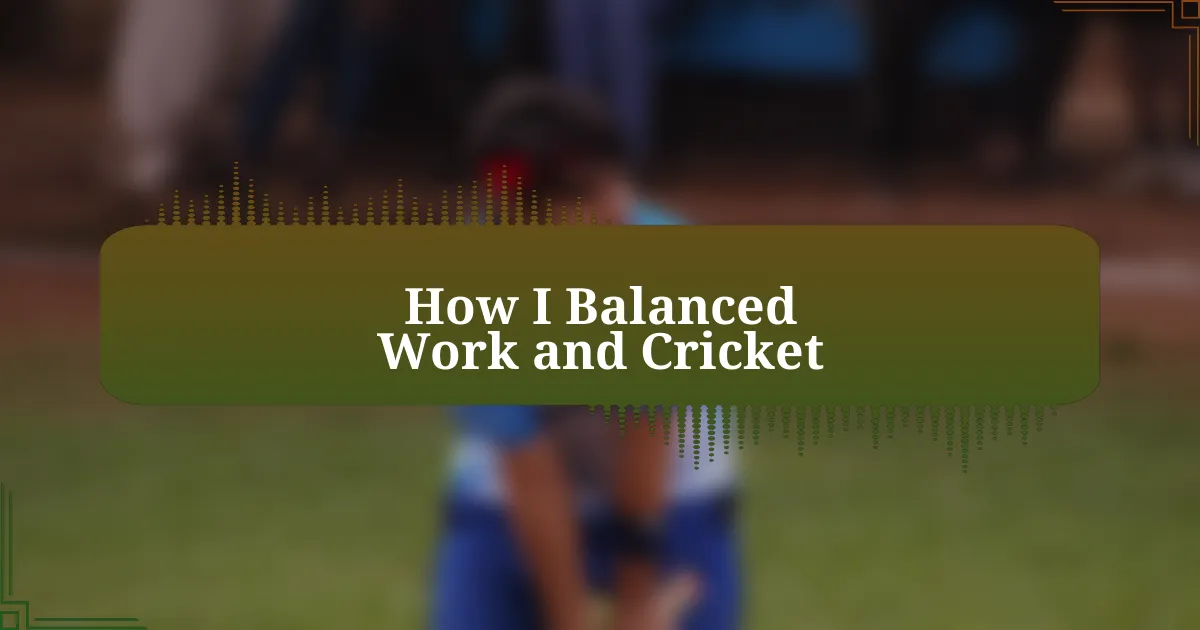Key takeaways:
- Work-life balance is essential for mental health and productivity; engaging in personal passions, like cricket, rejuvenates the mind.
- Effective time management techniques, such as prioritizing tasks and setting specific goals, enhance the ability to balance work and personal commitments.
- Creating a weekly schedule with dedicated time slots for both work and hobbies can prevent burnout and promote focus.
- Open communication with colleagues about commitments can foster support and understanding, allowing for a healthier balance between work and personal interests.
Author: Evelyn Harper
Bio: Evelyn Harper is an award-winning author known for her evocative storytelling and rich character development. With a background in psychology, she weaves intricate narratives that explore the complexities of human relationships. Her debut novel, “Whispers in the Wind,” received critical acclaim and established her as a fresh voice in contemporary fiction. A graduate of the Iowa Writers’ Workshop, Evelyn resides in Portland, Oregon, where she continues to write and inspire aspiring authors through workshops and mentorship. When not immersed in her writing, she enjoys hiking the Pacific Northwest trails and sipping coffee at local cafes.
Importance of work-life balance
Finding a balance between work and personal passions is crucial. I recall the days when I’d rush from the office just to make it to cricket practice, adrenaline pumping from the workday. It wasn’t always easy, but those moments on the field transformed my stress into joy, allowing me to recharge and refocus.
When I neglected my cricket for long work hours, I quickly felt the weight of burnout creeping in. I often wondered if pushing through the fatigue was worth it. The answer became clear when I realized how playing cricket rejuvenated my mind and spirit, enhancing my productivity at work.
Work-life balance is not just about time management; it’s about mental health and fulfillment. Have you ever felt mentally drained after a long day, only to find that playing a few overs lifts your spirits? For me, these experiences highlighted that dedicating time to what I love most is essential for thriving in both work and play.
Understanding time management techniques
Managing time effectively can sometimes feel like an uphill battle, especially when trying to juggle work commitments with cricket practice. One technique I found beneficial is prioritizing tasks. I vividly remember the days I’d write down my most pressing work duties on a sticky note, allowing me to clear my mind for an evening cricket match. This little ritual helped me focus on what truly mattered, laying the groundwork for a smoother transition from office to field.
Another method that worked wonders for me was setting specific goals, both for work and cricket. I recently set a personal target of attending three training sessions a week, while also aiming to complete reports ahead of deadline. This dual focus kept me motivated, making each successful training session a little reward for my hard work. Have you ever noted how goal-setting brings structure to otherwise chaotic schedules? It creates a roadmap that encourages dedication and accountability.
Finally, incorporating short breaks into my workday for quick cricket drills or stretching made a significant difference. I often stepped outside for just ten minutes to hit some balls against a wall, which not only refreshed my mind but also re-energized my body. This technique reinforced the concept that even small, dedicated moments can enhance your performance in both areas. What have you done to integrate your passions into your busy life? You might be surprised at how little time can create lasting motivation.
Setting priorities for cricket
Setting priorities in cricket has been a game-changer for me. I learned that defining what mattered most, whether it was training, matches, or personal development, allowed me to direct my energy effectively. I remember one particularly hectic week when my work deadlines were looming, yet I made it a point to pencil in practice time. That decision not only alleviated my stress but also kept my passion for the game alive.
Balancing work with cricket means making sometimes difficult choices. There have been moments when I had to skip social outings to prepare for a big match, and while it felt isolating at times, I realized that my love for cricket was worth those sacrifices. Have you ever found yourself torn between commitments, knowing you had to choose one over the other? Embracing this reality can redefine your passion; it’s about valuing the sport and recognizing the joy it brings into your life.
Moreover, staying flexible yet committed to my cricket priorities has proven essential. I’ve had instances where unexpected work demands clashed with practice times, and I learned to negotiate my schedule creatively. For example, I once rearranged some client meetings to ensure I could join my team for a critical match. In those moments, I felt a renewed sense of purpose, proving to myself that cricket wasn’t just a hobby, but an integral part of my life. How do you prioritize your passion when life gets busy? Finding that balance can lead to fulfilling experiences both on and off the pitch.
Creating a weekly schedule
Creating a weekly schedule starts with an honest assessment of my commitments. I remember the early days when I underestimated how much time work and cricket would demand. By carving out dedicated slots for practices and matches in advance, I was able to visualize my week and maintain focus. Have you ever felt overwhelmed by your calendar? Block out specific time for cricket can provide clarity and motivation amidst the chaos.
When I first began scheduling, I tried cramming too much into my week. I quickly realized that overloading my calendar resulted in burnout rather than balance. So, I started allowing buffer periods between work tasks and cricket commitments. Those moments of downtime transformed my routine; they became crucial for recharging. It’s essential to ask yourself: how much downtime do you truly need to perform your best on the field?
I always believe in reflecting on my achievements at the end of the week. One Sunday, after reviewing my schedule, I felt a rush of satisfaction seeing that I had both met work deadlines and trained hard. Celebrating those small victories fuels my motivation to keep going. How do you track your progress? Having a visual representation of my balance not only boosts my morale but reinforces my commitment to both pursuits.
Overcoming challenges in balancing
I’ve faced my fair share of challenges while juggling work and cricket. One particularly busy week, I remember rushing from a client meeting straight to the cricket ground, changing in the car. That moment made me realize that sometimes, I had to prioritize my mental space over my physical schedule. Have you ever found yourself in a position where you’re just going through the motions without truly being present? I learned that mentally preparing for each commitment was as crucial as showing up.
Finding effective communication has been another hurdle. In the early days, I hesitated to discuss my cricket commitments with my team at work. That fear often left me feeling guilty for taking time off for matches or practice. I decided to be upfront about my passion for cricket. Surprisingly, many of my colleagues were supportive and even curious about my sport. Isn’t it interesting how opening up can transform relationships?
Balancing work and cricket also meant learning to say no sometimes, which was tough for me. I remember turning down a project that would have demanded extensive overtime, knowing it would conflict with my league matches. That decision was daunting, yet it reinforced my commitment to my passion. How do you feel when you have to choose between obligations? Each time I stood my ground, I felt more empowered, reminding myself that both work and cricket needed my best self, not my exhausted one.
Personal experiences and insights
I’ve discovered that the early mornings often offered the best balance. I’d wake up before dawn to squeeze in a quick batting session at the nets. Those moments of solitude felt sacred; it was just me, the sound of the bat striking the ball, and an unfiltered connection to the game I loved. Have you experienced the peace that comes just before the world wakes up? It taught me that carving out time, even when the clock seemed against me, was key to nurturing my passion without compromising my work commitments.
There was a match that painfully coincided with a critical work deadline. I still remember the knot in my stomach as I debated whether to attend the game. Ultimately, I chose to prioritize my team on the field. I discovered a new level of resilience that day, realizing that the thrill of competition fueled my productivity at work. Balancing these two worlds hasn’t always been easy; have you ever found strength in your hobbies that carried you through tough days at work?
Having a support system made a significant difference for me. I started sharing my cricket experiences with friends and family, and their encouragement was uplifting. After a big win, the enthusiasm they showed was contagious, revitalizing my drive in both cricket and my career. It struck me that we often underestimate how powerful it can be to have people rally behind us. Isn’t it incredible how community can bolster our passions and provide a safety net when we need to take a leap?



